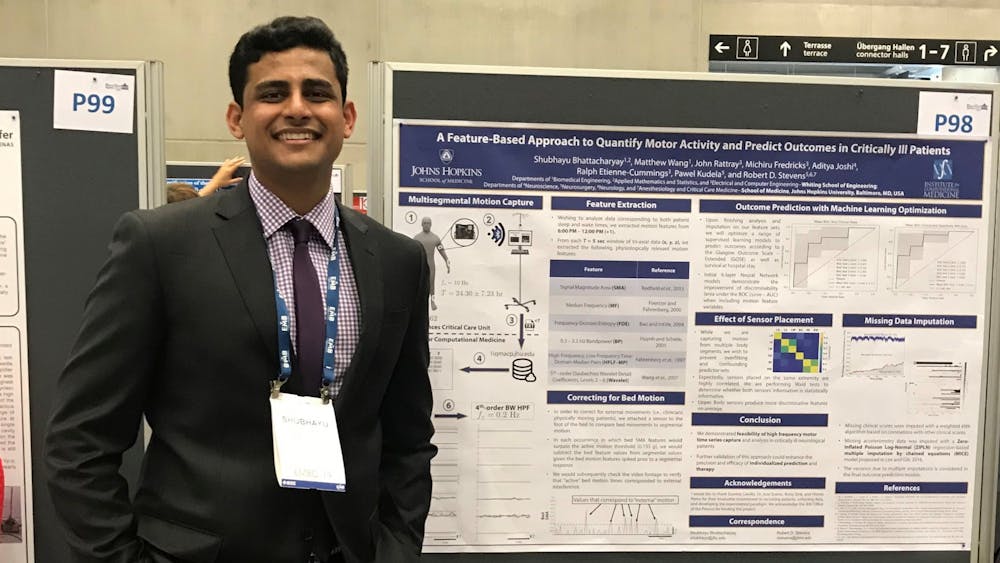Shubhayu Bhattacharyay, a senior studying Biomedical Engineering at Hopkins, recently received the Gates Cambridge Scholarship.
Established in 2000 by a donation from the Bill and Melinda Gates Foundation, the Gates Cambridge Scholarship program offers students from outside the U.K. the opportunity to pursue a full-time postgraduate degree at the University of Cambridge. Students are awarded this opportunity by exemplifying the program’s tenets of leadership, intellectual ability and commitment to helping others.
Bhattacharyay has been involved in computational medical research during his career at Hopkins, observing how treatments for neurological disorders can benefit from the use of computational models and techniques that rely on algorithms and motion data.
However, Bhattacharyay did not immediately immerse himself in this field of research. In an interview with The News-Letter, Bhattacharyay noted that he aspired to get involved with research opportunities in neurotechnology, but allotted time to develop the skills and knowledge to discover his research focus.
“I waited to do research. I developed the [necessary] technical skills, and I attended talks hosted by the Institute for Computational Medicine to [meet] people doing neuronal network modeling of the brain,” he said.
Bhattacharyay further explored his research interests during the summer following his freshman year by conducting research at Harvard University on how motion can yield computational biomarkers that can prognosticate outcomes for neurological disorders using animal models. This research sparked an interest in Bhattacharyay, who developed the idea to leverage his findings to study the possible similarities in studying motion data from brain injury patients to predict outcomes and cater treatments based on biomarkers.
Dr. Robert Stevens, professor of anesthesiology and critical care in the School of Medicine, supported the manifestation of Bhattacharyay’s research interests at Hopkins and eventually assisted in his procurement of the scholarship. Bhattacharyay noted that Stevens was able to connect him with faculty at Cambridge who are at the forefront of research in clinical neuroscience and computational medicine.
Bhattacharyay also acknowledged the robust research opportunities at Hopkins that enabled him to pursue this type of interdisciplinary research. As a recipient of the Provost’s Undergraduate Research Award, Bhattacharyay was granted the opportunity to travel to Europe and consult with different principal investigators of research at Cambridge.
Bhattacharyay also noted the unique ratio of world-class investigators to undergraduates at Hopkins, which means that any student can start a project of their interest.
Bhattacharyay has also been involved in a variety of extracurricular activities on and off-campus. He is a violinist in the Hopkins Symphony Orchestra and leads a design team in the Biomedical Engineering Department, where he and his team are building a hearing device for elderly patients with dementia.
Bhattacharyay has also been a member of HopMUN, the competitive Model United Nations team on campus, as he maintains a strong interest in international politics. His involvement in HopMUN has sparked another potential career — medical diplomacy.
“One of my major goals is to be a medical diplomat to leverage international connsections in medicine, science and technology to initiate peace talks between adverse nations,” he said.
Bhattacharyay has also volunteered weekly at the Esperanza Center, serving as a Spanish triage assistant. His commitment to assisting Spanish-speaking patients at the health center has reflected his belief in the importance of communicating with diverse, prospective patients and makes Bhattacharyay feel at home, as he closely interacted with the Latinx community in his hometown, Los Angeles.
Reflecting on what has grounded him, Bhattacharyay stressed how imperative his parents were to him in the scholarship process and his pursuit of education. Having moved from India, to Thailand, to Vietnam and then to Los Angeles, Bhattacharyay concedes that his parents have moved throughout the world to allow him to receive opportunities to explore his interests.
While at Cambridge to pursue his PhD in Clinical Neuroscience, Bhattacharyay is most excited about joining a prestigious community of scholars whose interests span multiple disciplines, a valuable opportunity Bhattacharyay admitted to having at Hopkins as well.
“[I will] closely interact with people outside of my discipline and meet people from different walks of life… I have to fit into this greater framework and I will always be surrounded by smart people from different fields, departments and nationalities,” he said.
For students wishing to pursue research in computational medicine, Bhattacharyay advises to gain fundamental knowledge and skills in computer science and mathematics in order to address critical problems and to establish professional connections with professors and research investigators.
Bhattacharyay also emphasized the intersectionality of data and fundamental sciences in this field of research.
“Data science research is not possible without good data, which requires strong experiments, which requires a fundamental understanding of physiology, anatomy and biology,” he said.
Bhattacharyay aspires to utilize his research experiences in computational medicine to interpret insight from data to provide leaders in fundamental sciences with greater resources for deciding how to implement different treatments. He looks forward to becoming an active member of the community.
“I hope artificial intelligence supplements time-sensitive decision support in neurocritical care for treatment selection and prognostication, predicting outcomes for patients,” he said. “I wanted to contribute to allowing physicians to have greater face-face interactions with patients and giving patients and their families greater autonomy when selecting what outcomes they want.”





